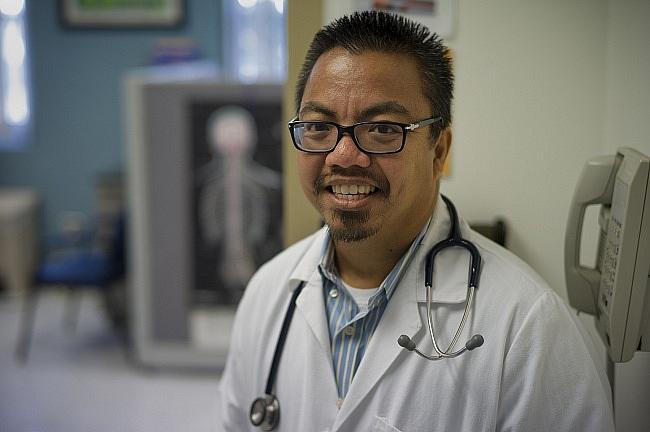Nurses in short supply for vets

They come to see Roman Samiley with complaints of headaches, an old bullet wound that still burns, or phantom limb pain of an arm or leg long lost on the battlefield.
Samiley, a U.S. Army reserve veteran and nurse practitioner at the West Los Angeles VA Medical Center, can help treat the physical aches. But it's the invisible suffering that takes a little more understanding.
"You have to be the jack-of-all trades when you work with veterans," Samiley, 42, said. "We try to treat as many issues as we can, because we don't always know if we'll see them again."
Samiley's specialty at the VA's primary care clinic is homeless veterans. Most of his patients served in the Vietnam War and come with diabetes or hypertension as well as mental health needs. His caseload is heavy: he cares for 800 people, mostly men - partly because of unfilled VA nursing jobs.
But veterans from Iraq and Afghanistan with combat-related wounds also are starting to fill the waiting rooms of hospital emergency departments and clinics, where nurses may not be ready for their specialty care needs.
"We have two things happening: a shortage of faculty who can train nurses and then a shortage of nurses who are trained to deal with special health care needs of veterans," said Darlene Curley, executive director for the Jonas Center for Nursing Excellence.
The center launched a scholarship program last year to help alleviate the shortage of faculty by offering 50 nursing students a $10,000 scholarship each to complete doctoral-level programs committed to veterans health care and teaching.
There are 3 million registered nurses working in various settings across the United States.
Of the 2.2 million veterans living in the United States who served in the Iraq and Afghanistan wars, 50,000 have been wounded and almost 15 percent have suffered some form of head trauma, according to the Wounded Warriors Project.
Women veterans make up 12 percent of Operation Enduring Freedom, Operation Iraqi Freedom and Operation New Dawn. For them, PTSD, hypertension, and depression were the top three illnesses treated by the VA hospitals, according to figures released by the U.S. Department of Veterans Affairs, formerly known as the Veterans Administration.
About 1 in 5 women seen in those hospitals respond `yes' when screened for "Military Sexual Trauma."
Samiley is one of several students from UCLA who received the scholarship and are working in specialized fields in veteran care, such as homelessness, head injuries, the pain of limb loss, women's health, the role of caregivers and post-traumatic stress disorder.
"It's hard for us to fill positions, but there really is a need for more, " Samiley said of open nursing positions at the VA.
The Jonas Center plans to offer scholarships until 2020, Curley said.
"It's an opportunity, but it is time sensitive in that we have current veterans that are here, and returning veterans that have special needs," Curley said. "With our program, instead of teaching the nurse, we train the teachers," to help build the nursing workforce that can care for vets.
Warnings of a nursing shortage were sounded years before the wars in Iraq and Afghanistan and the problem continues. An American Association of Colleges of Nursing report from 2010-2011 found "that nursing schools turned away 67,563 qualified applicants from baccalaureate and graduate nursing programs because of insufficient number of faculty, classroom space,and budget constraints."
Of the 1,800 applicants interested in UCLA's nursing program, 40 were accepted.
But the shortage also has shifted: demand for nurses at large urban hospitals has waned because older workers are reluctant to retire, a result of the economy, said Courtney Lyder, dean of the UCLA School of Nursing.
Lyder said professors are encouraging new graduates to consider long-term facilities, home-care nursing, or hospitals in more rural settings, where they may be working with vets.
"As our wonderful soldiers and Marines are returning, many come back with health issues; therefore the demand for health care for returning vets is only going to increase, and clearly nurses are at the forefront of caring for them," he said.
Judy McKelvy, who has been a registered nurse for 37 years, is also a Jonas VA Healthcare Scholar who is hoping to earn her Ph.D. at UCLA. Her specialty is the nurse's role in helping family members care for veterans, especially those suffering from polytrauma, or multiple injuries.
McKelvy knows the challenges for caregivers firsthand: her husband is a Vietnam veteran who suffered a spinal-cord injury in the war.
As more wounded soldiers leave veterans hospitals and re-enter civilian life, they are more likely to visit community hospitals, where nurses may not understand why they are acting a certain way.
"The role of the nurse is not only to recognize PTSD, but also to help a family member in the caregiver role to understand that certain behavior such as aggressiveness or agitation is a result of a mental trauma," she said.
At least 60 percent of injured vets are cared for by their mothers, while 30 percent are with their wives.
McKelvy said vets suffered the same types of trauma in Vietnam, but because they didn't have their health care needs met, were misunderstood or neglected, they suffered and so did their families.
"This is the hidden, invisible side of war that we need to bring out into the open," McKelvy said.
"Maybe if we as nurses teach veterans and family members to be aware of this, then maybe we won't make the same mistakes as we did with Vietnam vets."

